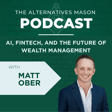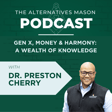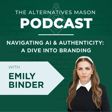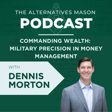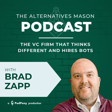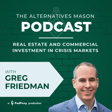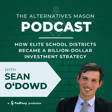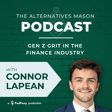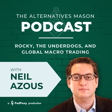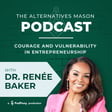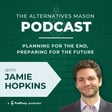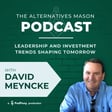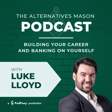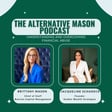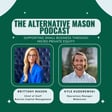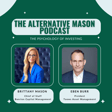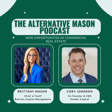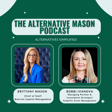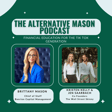Become a Creator today!Start creating today - Share your story with the world!
Start for free
00:00:00
00:00:01

The Alternatives Mason: Building Alts Knowledge Brick by Brick | Episode 30 | The Astoria Story: Investment Strategies and Entrepreneurship with John Davi
In this episode of The Alternative Mason, Brittany Mason chats with John Davi — founder of Astoria Portfolio Advisors and one of the sharpest minds in the ETF world. John shares how growing up in Queens shaped his hustle, how early stints at Merrill Lynch and Morgan Stanley fueled his love for markets, and what drove him to launch Astoria back in 2017.
They dive into how Astoria blends macro insights with quantitative research, what it’s really like to build an independent firm from the ground up, and where John sees the next big wave — from alternative investments to the rise of AI in finance.
Key Takeaways:
- Diversification is Crucial: It's the only free lunch in the market. A well-diversified portfolio can protect against market volatility.
- Blend of Macro and Quant: Astoria's approach of marrying macro insights with quantitative research offers a unique edge in financial strategies.
- Embrace Innovation: John Davi emphasizes the role of AI and crypto in modern investment strategies, highlighting their potential to transform portfolios.
- Calculated Risk-Taking: Davi advises taking calculated risks for higher rewards, a strategy that has propelled his success.
Connect with us below!
Transcript
Introduction of Mason and John Davey
00:00:00
Speaker
I was always fascinated with not only making money, but trying to grow it. And, um you know, the most successful people that I, you know, so I grew up in this part of Queens, Astoria, which was like an immigrant, you you know, kind of neighborhood, um you know, a lot of Greeks and Italians kind of off the boat.
00:00:18
Speaker
And I saw people kind of you know, these immigrants, you know, take their money, invest and did exceptionally well. And, you know, i was always fascinated with the concept of like how to best invest.
00:00:30
Speaker
There's real estate, there's obviously businesses. And I just thought that.
00:00:43
Speaker
everyone. I Mason. am your host for the alternative Alternative Mason and we are back with another episode. I'm very excited today because we have John Davey with us.
00:00:54
Speaker
John Davey is the founder of Astoria and brings over 25 years expertise in macro ETF strategy, quantitative research and portfolio management.
00:01:04
Speaker
Before launching Astoria in 2017, he led Morgan Stanley's institutional ETF content and portfolio solutions for some of the world's largest asset managers. He began his career at Merrill Lynch in 2000, where he helped pioneer ETF portfolio construction and raise billions in assets.
John Davey's Early Interest in Finance
00:01:23
Speaker
So i like to just dive in, you know to your background and your journey and how you got started, you know, in the finance industry in general, was finance something part of your childhood? Was this something that you started in young or did this come later on in life?
00:01:41
Speaker
um Good question. i would say that um you know I was always fascinated with not only making money, but trying to grow it. And um you know the most successful people that I you know, so I grew up in this part of Queens, Astoria, which was like an immigrant, you know, kind of neighborhood, um you know, a lot of Greeks and Italians kind of off the boat.
00:02:03
Speaker
And I saw people kind of, you know, these immigrants, you know, take their money, invest and did exceptionally well. And, you know, always fascinated with the concept of like how to best invest.
00:02:15
Speaker
ah There's real estate, there's obviously small businesses. And I just thought that, you know, finance was an easy way. so So you learned that really young, you'd say a lot of your childhood. How do you, that's interesting how it shaped you.
00:02:29
Speaker
So what was your first job?
Transition to Merrill Lynch
00:02:32
Speaker
Uh, first official job was i was actually in college and I i worked at a mutual fund call center and, um, I was like processing trades and kind of talking to, know,
00:02:47
Speaker
investors about mutual funds and how to allocate ah amongst the the the Dreyfus mutual funds. I did that during college. It was actually like a full time job ish that you could have gotten like after college, but I was able to kind of get my, you know, get my foot in the door.
00:03:04
Speaker
And then I i left um that to be an intern to kind of go backwards, like take a step back. And i was an intern in Maryland, which is equity derivative research group. And um I did that and my senior year of college. And then I joined the Merrill Lynch equity derivative research group as an analyst once I was done with college.
00:03:23
Speaker
So and and I spent like my first 10 years at Merrill Lynch in the derivative, you know kind of research group and and the trading floor. So what was that like, um you know, being part of that so early on? I mean, it must have shaped your career tremendously that early on.
00:03:41
Speaker
Yeah, you know, Merrill Lynch in the late 90s, early 2000s was definitely like a ahead of the curve in terms of um they created like these holders products, which were like basically like the first generation of ETFs um kind of fixed baskets that um didn't rebalance. Anyway, you'd buy like the Internet holders.
00:04:02
Speaker
I'm going to I'm going to call it fund because it was an ETF. There was like no creation redemption. But, um you know, so Maryland was a great place to work. You know, you know, my first boss was this guy, Steve Kim.
00:04:14
Speaker
um You know, he's an exceptional talent. um You know, Maryland was very early to get into like the model portfolios, which is kind of the space that Astoria is in now. So we would take like our strategist views and then kind of put ETFs around it.
00:04:29
Speaker
And, um you know, I was involved in that in the early 2000s. So it's a great place to work and learn for sure. Did you have any mentors that you could give credit to you that helped shape your direction? Was there like a pivotal moment where, um you know, because because clearly, you know, if you're doing something similar with the company that you founded now with Astoria,
00:04:54
Speaker
Yeah, I mean, the the guy that kind of had the group was this guy, Steve Kim, and, um you know, very smart, talented, exceptional. And he just took a shot. You know, he obviously had access to a lot of different people and colleges, but, you know, he wanted somebody he can kind of train and mold. And um I didn't really have any deep derivatives background, but, you know, he kind of trained me in helped me a lot. So I give him, you know, lot of credit. I mean, I've had other sort of good people guiding me over the years too, but he was the one that kind of like started for me.
00:05:27
Speaker
Love it. How would you describe derivatives to our listeners? I know we have a very diverse type of listener. um Of course, we have people who are specifically interested in alternatives and alts and how they work and ah you know But we also have newer independent investors as well that are listening and people who are newer to the industry. So could you just explain to our listeners how how they how they work and what they are?
Understanding Derivatives
00:05:54
Speaker
Derivatives. Yeah. um So it could be as simple as like, you know, a call option on a stock. And if you think a stock is expected to go up, you can put, you know, a hundred dollars.
00:06:06
Speaker
you know, if you had like a hundred dollars to invest, you can buy all hundred dollars and buy Delta, let's say, buy the online stock. Or you can just buy a call option that costs maybe like two, three dollars.
00:06:17
Speaker
And, you know, kind of like, you know, keep the rest to invest in other things and you kind of limit your losses to just the cost of an option. That's really like one of the most kind of basic fundamental.
00:06:28
Speaker
um And the way I would sort of ah make the analogy to to people that aren't familiar with derivatives is that, you know, sports players have like an option you year five or their contract that they could exercise, they don't have to exercise.
00:06:41
Speaker
And that sort of logic applies to like a call option on stock. um You know, you're entitled to buy it at a certain strike price. There's a maturity, you know, you can extend the maturity, you can unwind early, but you know, you kind of limited your losses to just the cost of that call option, as opposed to if you to just take a hundred dollars by the stock, you know, it could in theory go to zero the stock and you'd lose all of it.
00:07:06
Speaker
um So that's just like your basic, basic explanation.
00:07:13
Speaker
That's one option, I would say. Nice. So as far as, see this, you got involved with this type of, you know, these types of strategies through Merrill Lynch and then founded Astoria.
00:07:26
Speaker
So how, after spending years at major institutions, what inspired you to launch Astoria in 2017?
Founding Astoria and Entrepreneurial Motives
00:07:36
Speaker
Well, the goal was to always kind of be an entrepreneur and I i did want to manage money. So ah thought, let's kill two birds one stone.
00:07:47
Speaker
um So, you know, I had spent like a good, you know, 20 years working on the South side. I thought I accumulated a lot of skills. I work with, you know some of the largest institutions in the world, you know, biggest hedge funds, biggest asset allocators, you know, I'd go to Japan, Denmark, Sweden, talk to like, you know, central banks, big firms. And I just thought that I can take, you know, my knowledge of macro quant derivatives and kind of build portfolios for financial advisors.
00:08:17
Speaker
um ETFs were certainly not new, but, you know, at the time I thought it was like, you know, let's say like the third inning of the ballgame. And I thought there was like a long runway.
00:08:29
Speaker
um so I think at the time there was maybe like two, three trillion in ETF assets. Now it's at 10 trillion. And I just thought, you know, to have a firm that kind of dedicated to building institutional caliber strategies for financial advisors, you know, I thought I can have some edge.
00:08:47
Speaker
And, you know, investing is about having edges and lean and harden those edges to try and get the outcome you want. So that was the idea. And, you know, I was obviously younger than I am now, so probably had a little bit of naiveness.
00:09:01
Speaker
um But listen, it's been a great ride and I enjoy every minute of it. What did what would you say is like one of the biggest risks that you took early or in those early days of founding Astoria?
00:09:15
Speaker
And how did it pay off for you? Well, I mean, um to start a firm with like no track record, um you know, there is a Gips composite track record that goes back to 2010.
00:09:27
Speaker
um But, you know, in reality, you know, advisors want to see the firm kind of up and running for, you know, X number years, whether it's three, five years. So it was you know it was very, very hard in the beginning with not a long, firm track record.
00:09:43
Speaker
um So that was you know challenging. ah you know and Performance, I think, is is good. And you know I think we have you know past performance and indicative future results. But just those early years were really tough when like you know people were like, who are you? like Where are you calling from? and What do you want from me?
00:10:01
Speaker
So that was, you know, challenging and and a risk at the same time. But I think it's all, you know, it's it's working out and it has worked out. As an entrepreneur, how did you know it was the right time?
00:10:13
Speaker
You know, because timing is so much. I mean, it's it can be so important, you know, sometimes you're too early, sometimes you're too late. Yeah. How did you know it was the right time?
00:10:25
Speaker
We were living in a zero interest rate environment where interest rates were at zero percent you know for most of like the 2010 to 2020 period. So I left and I started a store 2017.
00:10:37
Speaker
And you know i just thought that you know kind of like it was such an unusual period. you know The whole interest rate environment has changed dramatically the last you know, three, four years, and it feels more normal now. So I think you you you know, you kind of got to get early, um you know, S&P was probably like 14 P ratio, we're now sitting at 22 and a half P ratio. So i think, you know, it's been a great ride for equities and interest rates have normalized. So I
00:11:08
Speaker
I think that's you know at the timing sort of worked out. ETFs were like three trillion assets, maybe four. Now we're at 12 trillion. So you know we think we've caught that wave. And when when I left, for instance, Morgan Stanley, I didn't have an entity set up, a single client.
00:11:25
Speaker
um you know and And we have now two and half a half billion dollars that we manage. We have something like 1,700 accounts. We have four publicly traded ETFs. So, you know, we benefited from that tailwind of like rise in stock prices, etf inflows.
Astoria's Investment Strategies
00:11:42
Speaker
so So tell me more about Astoria's philosophy and the foundation of the culture for what you think. Yeah, so um we have a lot of research, a lot of content.
00:11:56
Speaker
That's what we want to p pride ourselves on. um i would say we've got you know five CFAs on staff. you know Four of them are in our investment committee. And we really try and marry like macro companies.
00:12:08
Speaker
and quant. And so we like to say we're at the intersection of the two. I find some of my peers are just pure macro and they make big bets based on macro views or some people are just like very quant and say, you know, I believe in value or small cap and DFA and and we' we're really kind of the intersection of the of the two.
00:12:28
Speaker
And then we have like I'll just give you a little intro, but we have three verticals. um So basically the first vertical is like our managed ETF portfolios, which are like outcome oriented. It could be like income oriented. It could be risk based.
00:12:44
Speaker
But we have about $1.8 billion dollars in that. And it's a ah suite of you know ETF managed portfolios. um The second vertical is our quant stock selection models. We have about 200 million in that.
00:12:57
Speaker
And that we're mining for the alpha and the beta. So we're starting with like a large universe of stocks and ultimately drilling down to like 40, 50 that we think you know best represent that factor. Could be quality dividends.
00:13:10
Speaker
And then the third vertical is we're an ETF sponsor and we've got four ETFs, two equities, one fixed think income and one alternative. And I think like we're sort of you know, very rare that we kind of have these three buckets that I mentioned.
00:13:25
Speaker
um I find some people just in one or maybe in and two, but not in all three. So.
00:13:33
Speaker
So, but that's a diversification. It's so important, right? Is that, you know, Yeah, it's the only free lunch you know in the market, which not a lot of people you know want to diversify nowadays, if I'm being honest. People really think in portfolios are just about you know owning spies and queues and maybe some bonds.
00:13:53
Speaker
But um yeah, you have to be diversified across your portfolio and in your business segment for sure. here How do you balance quantitative research with real world human decision making?
00:14:08
Speaker
So, you know good question. I would say having spent 20 years on trading floors before Astoria started, um we were always, you technology and computers came at trading floors really hard and fast 20 years ago. And the best solution was always you know, human interaction with technology and it's the best of both worlds.
00:14:33
Speaker
I find out like in finance and you know investment management, like people are really scared of And would say like having so much experience with, you know, being disrupted, like finance has always been disrupted.
00:14:48
Speaker
I think you want to like, so we have like AI, we have technology tools, but we have a lot of humans that oversee it. And I think marrying the best of both worlds is, is is is best is the best outcome you can get.
00:15:01
Speaker
Mm hmm. How are you utilizing AI these days? Well, I mean, we have access to you know large language models. um You know, I would say that we you know use it for system checks.
00:15:15
Speaker
um You know, sometimes when we publish articles, you know, we'll you know, takes kind of the place of a human, you know, they can just do stuff for us like a lot faster. They allow us to kind of scale.
00:15:26
Speaker
um But, you know, a lot of our quant code is still done within like the traditional tools like fax it in Bloomberg. um And there's still like the human element over it.
00:15:38
Speaker
I think the AI within our firm is more so in like the sales and marketing, like note takers for the salespeople to do calls with advisors and then have that.
00:15:50
Speaker
you know, transcribed and then put into their CRM like that. That's kind of new, but um that's centered around like sales and marketing.
ETFs Misconceptions and Advisor Concerns
00:16:00
Speaker
What do you feel people most heavily misunderstand about ETFs?
00:16:10
Speaker
You know, i think it's definitely still like the there's two sources of liquidity with ETF, right? One is the primary market, which is what like screen liquidity.
00:16:20
Speaker
And then the other is like the creation redemption process, like, you know, the fact that you can create additional shares to source liquidity. You know, the biggest challenge we have as a smaller issuer is that people like our strategies. They think that we have alpha, but then they go on the screen and they see only 10,000 shares traded and they need a lot of education to kind of how to tap into that, you know, secondary liquidity.
00:16:45
Speaker
so that's and that's always been like a tough thing. But I think that's still the primary concern that and we still have like advisors that are concerned about fixed income ETFs.
00:16:57
Speaker
And, you know, like how efficient are they and whether they should buy like fixed in income mutual funds. But these conversations we've I've been exposed to for like literally, you know, 10, 12 years now at this point terms of the fixed income and in ETF liquidities, it's been, you know, ever since ETFs came out, that's been, you know, a concern for people.
00:17:22
Speaker
What role do you see alternative strategies playing with ETF based type of portfolios then today?
00:17:32
Speaker
Well, I know like your firm has alts and, um you know, alternative solutions, and i think that's still like an area that could be tapped into like hedge fund replication.
00:17:45
Speaker
um you know, I see like a lot of you know, private equity, private credit ETFs trying to be put into an ETF. I think that's still like an ongoing and obviously like all the crypto is a rage, like a lot of different crypto strategies are being launched as as an ETF.
00:18:03
Speaker
So the space is still small compared to like traditional stocks and bonds. But, um you know, I know on our side, we make a lot of our money through like our usage of alternatives. So I'm very keen on seeing like more alternatives being put in DTF because, you know, to be a diversified you know investor, like we talked about earlier, like the more solutions that are out there, better and the old space, you know, continues to be prime for more disruption.
00:18:34
Speaker
How so? How do you think what excites you most about alts? Well, i I do think that like traditional stocks and bonds, you know are well represented. There's a lot of, you know, I mean, you could buy one of 40 ETFs for like large cap U.S., you know, broad or sector, um you know, within the alternative space, there's not that many.
00:18:58
Speaker
um you know, we've been living in like now a structurally higher inflation world for five years. And, you know, we run an ETF tickers PPI.
00:19:09
Speaker
um that kind of tries to solve for higher inflation, um you know, this concept of like currency debasement. And I just think that that area is underrepresented and, you know, should be used more because if the goal is to get higher up in the Fisher frontier, you know, there's a couple ways to do it. it One is you could take leverage.
00:19:31
Speaker
capital efficiency. Another is just to protect your downside. And I know people think that stocks go up every year. I've lived through 10 years when stocks went down for 10 years.
00:19:42
Speaker
So I really like the alts ETF space. And i think it's still very prime for disruption. Do you have any predictions of disruption for the future? Or what would you like to see?
00:19:56
Speaker
think, uh, i think ah you know, the crypto space is interesting to me, like alternative, you know, uh, stores of wealth and I'm, I'm, I'm excited. I mean, I think nobody had in their crystal ball that, you know, the Bitcoin ETFs would accumulate, you know, a hundred billion in assets in two years or whatever the number is.
00:20:20
Speaker
So I think there's a lot more to come in that space. I'm, I'm really excited about that. I went to the Bitcoin conference earlier this year, there was a lot going on. It was, Pretty exciting.
00:20:31
Speaker
I'd like to learn more about that space as well. Yeah, absolutely.
00:20:37
Speaker
So in the last decade, how alternatives have evolved, I would say real estate is always like one of the biggest conversations for investments. But I've been hearing a lot of different feedback lately of people maybe not investing as much. What do you think?
Real Estate Investments as Safe Havens
00:20:59
Speaker
Do you think it's still a safe investment strategy? Real estate?
00:21:06
Speaker
Yeah, I mean, I put it in like the real asset bucket. So like tangible, physical assets, you know, um you know, we we put in our PPI ETF, um which is like kind of a real asset ETF.
00:21:21
Speaker
We started adding like physical real estate companies. data centers, power plays. um and If you think about like the AI build out, it's really exciting, like what's going on that space. um So you know some of these utility companies have become like you know now growth stocks and growth oriented.
00:21:42
Speaker
So I think the space is like really interesting. and you know we certainly have been out advocating for it within our PPI strategy. um So, yeah, I mean, that there's like, you know, there's like demographics in this country. We've got. 380 million people, there's 120 single family homes, there's a complete supply, demand and balance.
00:22:06
Speaker
um So, you know, I sort of like that symmetry and it feels like something you can lean on. Do you think the average person should still be prioritizing buying a home?
00:22:20
Speaker
Well, I think it goes into like, you know, their personal situation. But like for me, like growing up in Queens, um I mean, this may sound, you know, i don't know where you were born or raised, but like the the property values that I've seen in like Brooklyn, Queens, Manhattan have just like gone up exponentially. Exponentially. Yeah.
00:22:41
Speaker
Yeah. and And I think like, you know, it was always in like the big metropolitan cities like Chicago, l L.A., San Fran, Virginia, D.C., New York. um But, you know, you're starting to see growth outside of those regions, too, which I think, you know, happen. I mean, COVID definitely accelerated it.
00:22:59
Speaker
But I always say like a physical real estate is always a good asset to own in your entire portfolio. I agree. i just saw, um i don't I don't know if you saw maxwell Maxwell House, they're pretty clever marketing. They just released Maxwell Apartments.
00:23:18
Speaker
Oh, really? Yeah. Yeah. As ah you know acknowledging the lack of homes being purchased by millennials and Gen Z. So yeah, I just wondered what you're, I've been hearing different mixed mixed opinions on real estate and, you know, you know, newer investors, where should they primarily be focusing on pushing their investments?
00:23:45
Speaker
Yeah, I think interest rates will come down. um Kind of haven't been exposed to Trump, you know, being in a New York, New Jersey guy and did a lot of real estate in, you know, Jersey and New York.
00:23:58
Speaker
You know, he's going to want lower interest rates and that should be like a further tailwind for real estate. So um you know I think Powell's got kind of an expiry date, right? So next kind of ah spring.
00:24:12
Speaker
um And I think that you know he's going to put someone in there that will lower interest rates because that's what he wants. And that'll that'll be the next leg high for real estate, in my opinion. and Well, I hope so.
00:24:24
Speaker
I'd like to see some of those some of that come down. I think we all would. We could all use a little bit of a break. and Yeah, no, I hear you. what alternative strategies do you feel have been overlooked for investors right now What do you think we should be paying more attention to?
00:24:45
Speaker
Well, you know, i have a horse in this race, so we launched PPI three and a half years ago, actually almost four years ago. And at the time, you know, CPI inflation was, you know, four on its way to nine.
00:24:59
Speaker
And we thought that we'd live in a structure of higher inflation. So we definitely think that portfolios need to go away from just nominal bonds and just nominal exposures.
00:25:11
Speaker
JP Morgan put out a pretty big report saying like the currency, the basement trade. And that was a rationale for why gold is going up and Bitcoin. And, you know, investing is about having like a forward looking view and looking beyond, you know, six months, 12 months.
00:25:28
Speaker
And our fund is up like, umma I think it's like up 29, 30 percent year to date. um you know It's been in the S&P by quite a bit. you know Since we launched it three and a half years ago, we've been in the S&P by over 20% and the valuations are pretty low.
00:25:47
Speaker
So I do think that people need to kind of go beyond just traditional stocks and bonds. I know your firm, you know you do preach alternatives. um I do think the private credit and the private equity space, you know there's a lot of money going into that.
00:26:03
Speaker
And I'm concerned that it's you know chasing too far deals. But your traditional just allocate towards like gold, some commodities you know has worked well um in this current cycle, inflation cycle that's now almost...
00:26:19
Speaker
you know, four years plus. So that's what we think, you know, portfolios need to evolve to is owning more, you know, real assets, commodities, um you know, fixed supply assets.
00:26:32
Speaker
What are some of your favorites? Any in particular? ah You know, we do like Bitcoin. I put out a report and a story when Bitcoin was at ten thousand dollars. It's obviously now like one twenty ish.
00:26:47
Speaker
um You know, obviously the ETFs have only been around for the two years. So, you know, we are advocates for gold, Bitcoin. We are using PPI in our own managed portfolios.
00:27:01
Speaker
um You know, I'm a big fan of. real estate, like physical real estate, I've got a rental property of my primary homes. And those have been very good investments.
00:27:12
Speaker
um So all the above is kind of what I've been what I would sort of advocate for and what we're doing for our investors at Astoria. Diversify. But you said people are not wanting to diversify much lately.
00:27:25
Speaker
It's always challenge because you know stocks keep going up and S&P is up 14% year to date, back to back 25% years. um you know It is challenging for sure, but you know on the margin, I think it is slowly happening.
00:27:45
Speaker
So what do you see in the next five to 10 years for Astoria?
Astoria's Growth and Future Plans
00:27:50
Speaker
What excites you most? Well, we're we want to grow for sure. We want to expand our team.
00:27:59
Speaker
um you know I think ah you know our plan is not to have 20 different ETFs, but you know we definitely feel like we can come out with you you know one per year that'll kind of solve a need for our investors. And then like outside investors will also take ah take suit.
00:28:15
Speaker
You know, I'm very excited about you know the usage of AI for sure. um i think the k crypto space is really, really interesting. um People didn't give it enough credit, but I think it's proven just based on the flows that we've seen.
00:28:31
Speaker
So the combination and the intersection of technology, AI, invest in finance, more efficient portfolios, you know, that's a space we want to be in. And, um you know, helping get better outcomes for our advisors. i mean, that's like our stated mission.
00:28:48
Speaker
So if you could tell anything to that kid growing up your younger self in Astoria, what would you what would you tell him? You know, take risks, um calculate it, um but take risks because the reward is great.
00:29:06
Speaker
And there is a fundamental like, you know, if you take more risk, you should be rewarded. And I've i've seen that happen in my career and other people's anecdotally. So, you know,
00:29:18
Speaker
America is is sort of prime for, you know, that entrepreneurial spirit. And, you know I have a four year old son, two teenage daughters, too. But, you know, I would tell them all like, you know, just go for it.
00:29:30
Speaker
You take risk and work really hard and you'll be rewarded. What are you teaching them as far as um the foundation of finance goes? you know, like compounding your money over time. Like, so I am definitely preaching to them, like be in the market, let your money compound.
00:29:49
Speaker
um You know, it's been a great cycle the last, you know, 10, 15 years. So don't just assume that US is only game in town, diversify across the globe.
00:30:00
Speaker
But, you know, the more you can kind of invest and compound your money for long periods time, i mean, it really does wonders for your overall financial health. who Are there any tools that you recommend new investors using any apps or you know, anything to help them manage their own money or their own portfolios?
00:30:27
Speaker
um I would start with some books, um you know, just to kind of read some of the seminal foundational books like you know books, you know, random walk down Wall Street, you know, a lot of the John Bogle books.
00:30:41
Speaker
um I really got into like some of these hedge fund guys, you know, like Howard Marks. He's not a hedge fund, but, um you know, there's some really good books written like you know, document and interview and hedge fund managers and kind of reading how they assign risk and how they take risk and measure it.
00:31:01
Speaker
um You know, the more you can read, i think the better. i think first you have to learn about like finance and then I think you can use apps. um I hear you, though a lot of people like getting apps to trade, but I think some of these apps are doing like more harm than good. Oh, OK.
00:31:20
Speaker
Yeah. So I think before you start trading, you know, zero day options, you kind of have to understand what the stock is and, you know, whether it's good or not. So who where do you find but your best research?
00:31:36
Speaker
Um, Well, we do a lot of our own research, lot of you know youth data. um But some of the books, I think, like would be a good place to start.
00:31:47
Speaker
And then once you get like the principles down, then it's like easier to have the impact that you know you're trying to solve for. do you have any favorite podcasts? Do you listen to a lot of podcasts or more reading?
00:31:59
Speaker
Um, I do like Jeremy Schwartz's podcast. He's got like Professor Siegel. I can't remember the name. It's like the Warren Business School podcast.
00:32:12
Speaker
um I do listen to like the all in podcast, which, you know, That's not just about finance. It's kind of the intersection of like finance, invest in politics, science.
00:32:23
Speaker
um Met Favors got a really good podcast, more so dedicated to finance. um Was there a moment where you knew Astoria made it? Did you have like an aha moment where you were like, oh, we're we made it. We're in now. Yeah.
00:32:47
Speaker
We got a lot of traction when we launched our PPI Tiff. It was kind of the first to market. Yeah. That was that got a lot of like you know, good accolades, you know, when you run SMAs, you know, that's one thing. But, you know, having an ETF you know feels real.
00:33:03
Speaker
um And then like we did a second one and that also got you know very well regarded. i think, you know, over the years, like, OK, we launched a third one, a fourth one.
00:33:16
Speaker
we We host like an annual conference. Actually, i have Shanna you know speaking on my conference at Nasdaq. And um you go to story advisors dot com, you'll see kind of like the people, the sponsors. But last year when we when we hosted it, we had like 150 people and that you know really felt good because like, all right, you know, now we were able to kind of fill up a room with some of the best thought leaders out there and the biggest firm sponsoring.
00:33:45
Speaker
And that sort of felt like a ah big moment for us. You said that was last year. Yeah. like And we're coming up on our second one in October 20th. So October 20th. All right. Fantastic.
00:33:59
Speaker
All right.
Final Thoughts on Risk and Learning
00:34:00
Speaker
Is there anything else you would like to leave our listeners with before we go
00:34:09
Speaker
Just learn as much as you can. What would you say are the top three traits you have that have contributed for your success? Um,
00:34:21
Speaker
Work hard, learn as much as possible. And then like, you know, rinse and repeat.
00:34:29
Speaker
ah Every day, every day. I love that. All right. Thank you so much, John. That is the time we have. I appreciate it for you taking all the time that you've got to give us these wonderful insights. Thank you everyone who has tuned into this episode with John Davey and we will see you next time right here.
00:34:49
Speaker
on the alternative Mason. Thank you so much. Thank you so much.
00:34:58
Speaker
The opinions expressed in this program are for general informational purposes only and are not intended to provide specific advice or recommendations for any individual or any specific security. It is only intended to provide education about the financial industry.
00:35:12
Speaker
To determine which investments may be appropriate for you, consult your financial advisor prior to investing. Any past performance discussed during this program is no guarantee of future results. Any indices referenced for comparisons are unmanaged and cannot be invested into directly. As always, please remember investing involves risk and possible loss of capital.
00:35:32
Speaker
Please seek advice from a licensed professional.
